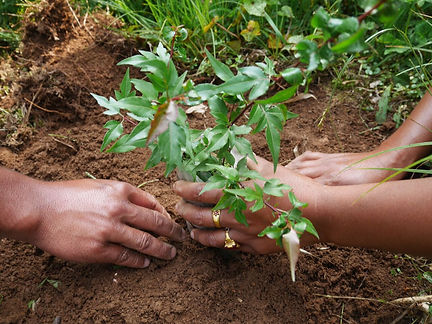
KHASI HILLS
Assisted natural regeneration, sustainable and livelihood development. Through limiting further deforestation, the Khasi's biodiversity and communities are now flourishing.
PLANTING PARTNER
WeForest

Eastern States of Meghalaya, Khasi Hills, India
TreeSisters arm of the project was successfully completed in 2019. The Meghalaya ecoregion is characterised by its rich biodiversity, sacred forests, ancient stone monoliths and indigenous communities.
The area is home to the Khasi people, who are the most populous, as well as the Jaintia and the Garo indigenous groups. These groups have governed the forest lands in the area utilising the centuries-old, traditional forest management system.
Before the project, the Khasi Hills forests were severely degraded and cleared for cultivation, timber extraction, crops, mining and developmental activities. The area has been described as one of the wettest places on Earth. 'Meghalaya' translates to 'the abode of clouds' in Hindi and Sanskrit. Because of their high altitudes, forests literally "meet the clouds", explaining the term 'cloud forests'.
IMPACTS.

492
Hectares of forest

84,000 tons of CO2 removed from the atmosphere over next 20 years

410,343
Trees planted
LOCAL IMPACT.
WeForest worked with a federation of 11 indigenous governments and 75 Khasi villages to restore forest areas. It was one of only a few reforestation projects run by indigenous communities at the time. These communities set up nurseries to provide seedlings and formed groups of volunteers to plant and tend to the forests. The project employed the community to grow natural forest patches and protect them as they grow.
While men exclusively run the indigenous governments in the Khasi Hills, the project sought to have women playing a significant role in all socio-economic activities. By creating clubs and groups and managing nurseries, women saw an increased role in the community's organisation. Several women started micro-enterprises and businesses because of the project's success.


IMPACT ON NATURE.
More than 110 mammal species and many threatened species, including the clouded leopard, sloth bear, Chinese pangolin, and smooth-coated otter, call the Meghalaya Subtropical Forests home.
Beyond restoring this highly biodiverse area, the project indirectly contributed to restoring the Umiam watershed (East Khasi Hills) by increasing water supply and quality.
TreeSisters also estimates (through extrapolation of previous reporting) that through your support and the trees planted, 84,000 tons of CO2 will have been removed from the atmosphere over the next 20 years of tree growth.
PROJECT IMPACT.
TreeSisters began supporting planting partner, WeForest, on this project in India's Khasi Hills in October 2017 and successfully achieved its aims in 2019.
The Khasi Hills people have successfully undertaken restoration work on 3,000 of the 4,000 hectares currently allocated for forest restoration. As the project has been so successful, WeForest aims to phase out the area's reforestation efforts by 2025. In 20 years, the three planting sites will mirror the surrounding natural forests, with over 20 native species of tree and a tree density of approximately 833 trees per hectare.

Project Gallery

























